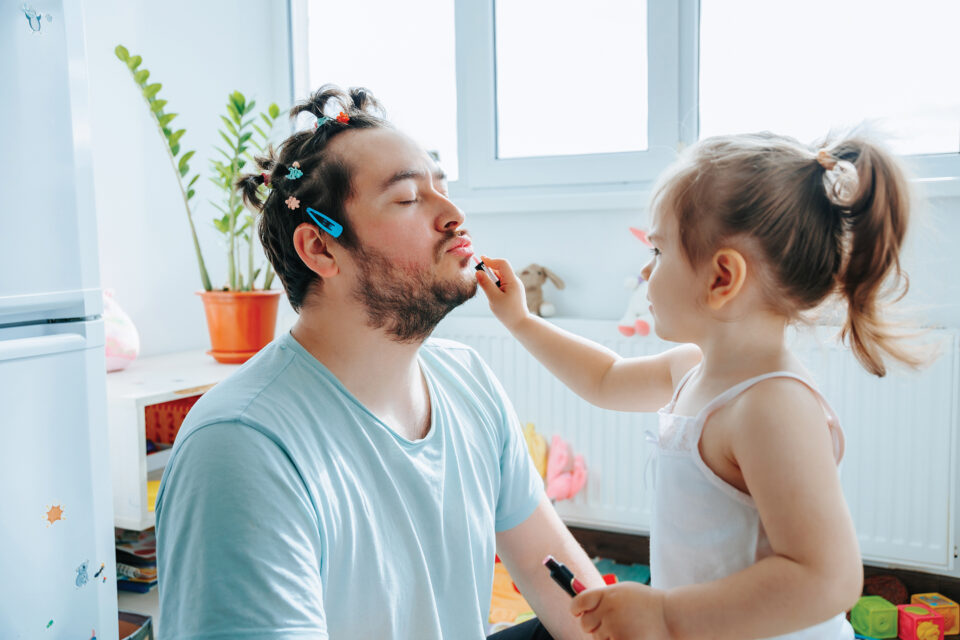“I know I should play more with my child, but I usually last about five minutes before I start thinking about all of the other more important things I need to do,” one mom says. “And then I just have to get up.” She doesn’t want anyone to know her name. But she’s like a lot of parents today: overwhelmed by to-do lists, work and, well, more satisfying preferences. “I start feeling guilty about not playing with , but what’s the point of playing if I’m just dialing it in?”
This mom isn’t alone. Many parents with toddlers know they are their child’s first teacher but still dread the constant need of their little ones for attention and interaction. The importance of developmental play for babies and young children is non-stop, but so is the need for parents to satisfy themselves. How can a parent who doesn’t like to play with their child become one who does?
By recognizing that playing is beneficial for adults. In the middle of busy family life, taking the time to do fun, mindless play time is actually good for you — and research bears it out.
WHY SO SERIOUS?
You’re sweeping the kitchen floor and the laundry is spinning in the dryer. You have plenty of errands you’d like to knock out today, but your 4-year-old runs in.
“Mommy, can you play with me?” Her face is hopeful and excited.
“Honey, just a minute, when I’m done I can play.” She runs from the room and returns fast with a favorite toy.
“Now can you play, Mommy?”
Mommy’s shoulders drop and she lets out a sigh.
“I just have to get the clothes from the dryer, sweetie.” Mommy’s tone is a bit impatient.
The 4-year-old begins to spin about, waiting but watching.
“Now, Mommy?”
“Honey, just —”
“You never play with me!” the little one whines, defeated.
And of course, that’s never what you want. But how do you get around the nonstop needs of your home, work and all that life entails to squeeze in time for all-important play with your child without dreading it?
WHAT THE RESEARCH SAYS ABOUT ADULTS
Recognizing that play is actually good for YOU — not only for your child, but healthy and stress reducing for YOU — may help you find a reason to get down on the floor with your Little. If you dread doing it for your child, do it for you.
Plenty of adults spend a lot of money trying to find ways to eliminate the stress in their lives by working out at the gym, seeing a therapist, drinking wine, smoking pot or whatever. Playing costs nothing and is fundamental to your well being and your child’s.
Play activates the reward centers of the brain, floods the rest of the brain with feel-good chemicals like oxytocin and triggers the release of neurons that promote learning and mental flexibility, say authors Julie Jones, PH.D. and Jed Dearybury in their book, The Playful Life: The Power of Play in Our Every Day (Jossey-Bass; 2022). The two also have a popular podcast, “We Are Playful,” where they chat about playful living and how to be more intentional about play. It causes stress hormones to drop, mood to lift and has an energizing effect, they attest.
Researchers say playfulness in adults is linked to certain desirable characteristics like making people laugh, the ability to ease tension and increased creativity. Somewhere between childhood and adulthood many parents stop playing, exchanging the joys of spontaneity, goofiness and a simple playful lifestyle for more serious “adult” endeavors that require planning, organization and importance. But literally, play helps to reduce your stress, improve your brain function, improve relationships with others and keep you young. Play helps you to improve your social life, teaches new ways to get along with others and it can heal wounds, too. So while it’s all well and good to admit that you may not like playing with your child — and hearing that others feel the same — you don’t want to stew in feelings of unhelpful guilt or depression because of it. You need to find a way.
HOW TO PLAY WITHOUT RESENTING IT
While your kids are little — while they need your attention and before you can begin arranging play dates for them — build all-important playtime into your daily life without resentment, Jones and Dearybury advise. Now that you know how important playfulness is for you, you can:
• Schedule play time: Take 20 minutes a day to get down on your
child’s level and just play (whether you’re leading or your child is).
• Give undivided attention: Turn off your cell phone and play with
out distraction. It’s OK to turn on some music you love.
• Be on your child’s level: Sit on the floor and match your child’s in-
tensity. If they’re loud, be loud. If they’re banging dinosaurs to-
gether, bang away.
• Repeat: Children learn from repetition. It may drive you nuts, but
realize it’s how your child learns.
• Go for laughs: Laughter really is great medicine.





